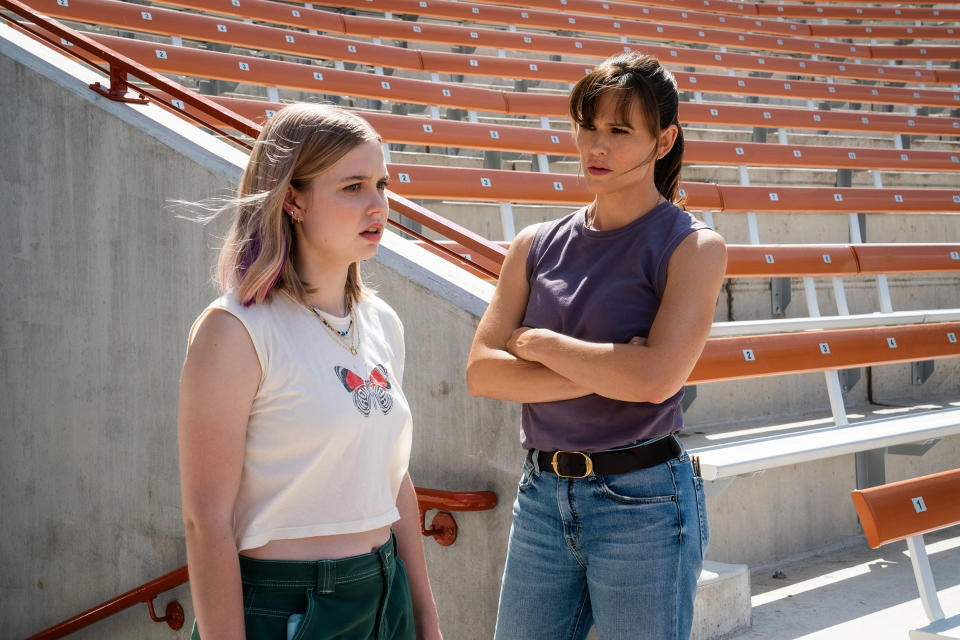'The Last Thing He Told Me' ending, explained by star Angourie Rice
Warning: This post contains spoilers for all episodes of "The Last Thing He Told Me."
After a suspenseful journey from Sausalito, California, to Austin, Texas, to find Hannah Hall's missing husband, the real love story of "The Last Thing He Told Me" has turned out to be the relationship between a mother and daughter.
The Apple TV+ show aired its finale episode May 19, entitled "Sanctuary," wrapping up the mystery of why Owen, Hannah's husband, went missing.
But fans of the sweet marriage acted out on screen by Jennifer Garner and Nikolaj Coster-Waldau are likely to be disappointed. These lovebirds don't get their happy ending.
But Angourie Rice, who stars as Hannah's angsty stepdaughter, Bailey, says the real message of the show is one of "found family."

“In the end, Hannah chooses Bailey, and Bailey chooses Hannah,” Rice tells TODAY.com. “So that to me was such a beautiful story about what motherhood and daughterhood, if that’s a word, can be."
What happens at the end of 'The Last Thing He Told Me'?The show get its name from one of the first scenes. When Owen's company is under investigation for fraud, he disappears, leaving his daughter, Bailey, a duffel bag full of cash and new wife, Hannah, a note that simply says, "Protect her."
Throughout the show's seven episodes, Garner's character does exactly that. After taking the pair to Austin, Texas, to follow a lead from deep in Bailey's childhood memories, they discover a picture of a woman who looks exactly like Bailey on the wall.
Hannah, sensing that Owen and Bailey were in California running from something, tries to get Bailey to lave Texas. But Bailey goes rogue, wanting to learn the truth about who she is and where she's from.
In short, Owen — whose name was originally Ethan Young — and Bailey had to run because his former father-in-law, Nicholas, was a lawyer for a crime syndicate. One of those associates ended up killing Nicholas' daughter and Owen's wife, Kate. Owen exchanges information on the family business in order to get legal protection and runs away with a young Bailey, who was originally named Kristin.
In the end, Hannah realizes that Owen left Texas as part of the witness protection program to protect Bailey, knowing that with his new identity compromised, wherever he goes next puts himself and the people he's with at risk.
In a heartbreaking twist, Hannah remembers the note her husband left her and strikes a deal with Nicholas: He offers protection for her and Bailey — not Owen — in exchange for the possibility of getting to know his granddaughter.
As the duo leave Austin to head back to California, Bailey holds Hannah’s hand in a rare moment of affection.
The show then jumps five years in the future, and Hannah briefly runs into a haggard and disguised Owen in her shop who passes along a secret message — "The 'could've been been boys' still love you" — a reference to a past conversation, and Owen's way of expressing his lasting love.
But maybe the real happy ending is found in the show's last line. As Bailey meets up with Hannah, she walks into the shop, smiling, and calls out, "Mom." After their previously vexed relationship, Bailey has finally embraced Hannah.
Rice says the takeaway from the ending of the show is that the most important thing is all the "relationships you form with people."
"You can find joy and comfort and a happy future," she says. "Even if it's not the one you thought you were going to have five years ago, it's the place where you are, and the place where you end up, is still meaningful and still important, even if it was unexpected.

Angourie Rice on Bailey's future
At the beginning of the show, Bailey rejects Hannah’s attempts at forming a relationship. It was hard to be mean to Garner, who Rice describes as “nice, caring and kind.”
“It doesn’t make sense in real life, but in the world of the story, to me, Bailey’s actions were so justified,” Rice says.
Rice describes Bailey's character arc as one based less on personal development and more on her relationships with other people. The character already has a refreshing sense of self — which she tries to cling to as she learns that her actual identity is a lie — defined by her sarcasm, her love for musical theater and her desire to be treated like an adult.
"Even though she's mean, a lot of the stuff she says is quite funny. That becomes less directed towards Hannah as it becomes Hannah and Bailey against everyone else," she says.
What helped create that change was Bailey finally learning what Rice says many teenagers want to hear: the truth.
"Bailey was sick of being treated like a child because a very grown-up, adult thing had happened to her — this crisis," Rice says. "And she felt that she couldn't deal with it because she didn't know the truth."
"I think one of the breakthrough moments for Bailey and Hannah's relationships is when Hannah starts telling Bailey the truth," she adds. "And even if it might be too much for a young person to hear, when she finally has all the information, that's how she can heal and move on from it."
It’s unclear if Bailey will actually take her grandfather up on his offer. Rice says she isn’t sure if Bailey would have chosen to meet her estranged Texas family. “That’s a question for Laura Dave,” the original book’s author, Rice says.
“I think I have my own personal ideas of what would have happened to Bailey, but I feel like they’re just for me,” she adds. “For me, it’s just like my own private continuation of whatever happened.”
This article was originally published on TODAY.com

